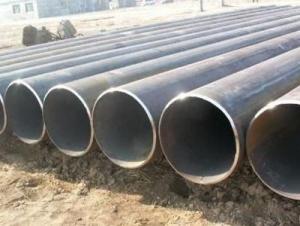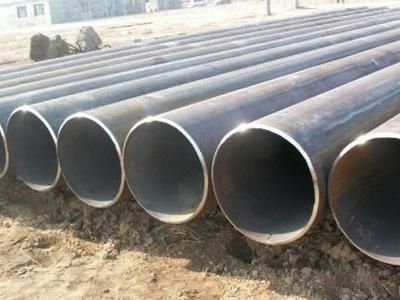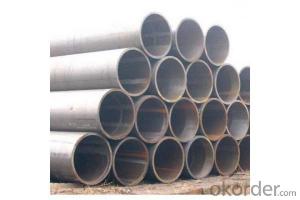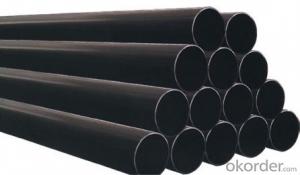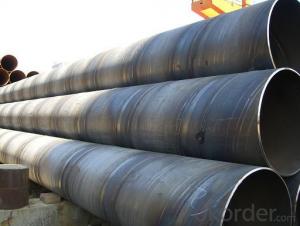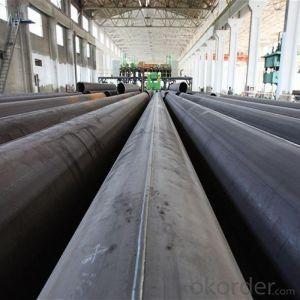API SSAW LSAW CARBON STEEL PIPE LINE OIL GAS PIPE 56‘’
- Loading Port:
- Tianjin
- Payment Terms:
- TT OR LC
- Min Order Qty:
- 1 m.t.
- Supply Capability:
- 3000 m.t./month
OKorder Service Pledge
OKorder Financial Service
You Might Also Like
Packaging & Delivery
Packaging Detail: | standard export packing or as customer's requirement |
Delivery Detail: | within 10 - 30 days |
Specifications
Spiral Welded Steel Pipes and Tubes
1.Material:Q195-Q235
2.Length:1-12m
3.WT:1.0-14mm
4.O.D.:20-273mm
Spiral Welded Steel Pipes and Tubes
Product Description:
1.Material : Q235,Q345,L245,L290,L360,L415,L450,L485,GrB,X42,46,X52,X56,X60,X65,X70,X80,X100
2,Standard: SY/T5037-2000,GB/T9711-2011,API Spec 5L PSL1/PSL2,ASTM A252\A53,ISO3183,DIN17172,EN10217,JIS G3457,AWWA C200,ASTM A139,ASTM A671,ASTM A672
3.Wall thickness: 3.0mm-30mm
4.Outer diameter: φ168mm-3020mm
5,Length: 5m-12m or as your requirement
6,Corrosion protection standard: DIN30670,DIN30671, AWWAC210, AWWA C203, SY/T0413-2002,SY/T0414-2002
7,Application: Oil, gas, natural gas, water pipe, thermal electricity pipe, steel structure engineering, etc
Q195-q345 Material Steel Pipe's Materials
Elements | Chemical Compsition% | Mechanical Property | ||||||
C% | Mn% | S% | P% | Si% | Yield Point (Mpa) | Tensile Strength(Mpa) | Elongation | |
Q195 | 0.06-0.12 | 0.25-0.50 | <0.050< span=""> | <0.045< span=""> | <0.030< span=""> | >195 | 315-430 | 32-33 |
Q215 | 0.09-0.15 | 0.25-0.55 | <0.05< span=""> | <0.045< span=""> | <0.030< span=""> | >215 | 335-450 | 26-31 |
Q235 | 0.12-0.20 | 0.30-0.70 | <0.045< span=""> | <0.045< span=""> | <0.030< span=""> | >235 | 375-500 | 24-26 |
Q345 | <0.20< span=""> | 1.0-1.6 | <0.040< span=""> | <0.040< span=""> | <0.55< span=""> | >345 | 470-630 | 21-22 |
Packaging & Delivery
Packaging Detail: | Normal exporting packing,in container or bulk vessel or as per clients' request |
Delivery Detail: | 2 months after confimed contract |
Specifications
Large Diameter API 5L X70 PSL2 LSAW Steel Pipe
Grade: X42, X46, X50, X52, X60, B, C
OD: 1.5"-28"
WT: SCH10-SCH160
Large Diameter API 5L X70 PSL2 LSAW Steel Pipe
Specifications:
u Standard: API 5L
u Grade: B, C, X42, X46, X50, X52, X56, X60, X65, X70, X80
u OD: 1.5"-28"
u WT: SCH10-SCH160
u Length: 5-12m
u Ends Finish: plain end, bevel end, grooved end
u Surface Treatment: bare, black varnished, oiled finish, red color, anti-corrosion, 3PE, FBE or epoxy coating
u Technique: hot rolled or cold drawn
u Application: api 5l steel pipe for conveying oil, water, gas
u Invoicing: based on theoretical weight or actual weight
u Payment Terms: L/C at sight, T/T or Western Union
u Trade Terms: FOB, CFR, CIF
u Certification: ABS manufacturing assessment, ABS design assessment, API 5CT, API 5L, DNV manufacturer certificate, ISO9001 quality management system certificate, ISO14001 environment management system certificate, GB/T28001 occupational health and safety management system certificate, A1 class manufacturing license of special equipment certificate, CCS, GL, LR, SGS, TüV, PDE
- Q: How are steel pipes used in the agricultural irrigation systems?
- Steel pipes are commonly used in agricultural irrigation systems due to their durability and strength. These pipes are used to transport water from a water source, such as a well or a reservoir, to the fields where crops are grown. One of the main advantages of using steel pipes in agricultural irrigation systems is their ability to withstand high pressure and heavy loads. This makes them suitable for transporting large volumes of water over long distances without the risk of bursting or breaking. Steel pipes also have a high resistance to corrosion, which is important in agricultural settings where the pipes may come into contact with fertilizers or other chemicals. In addition to their durability, steel pipes provide a smooth interior surface that helps to minimize friction and maintain a consistent water flow. This is crucial in irrigation systems as it ensures that the water is evenly distributed across the fields, promoting optimal crop growth. Furthermore, steel pipes can be easily connected and configured to match the specific layout and requirements of the irrigation system. Overall, steel pipes play a vital role in agricultural irrigation systems by facilitating the efficient and reliable transport of water to crops. Their strength, durability, resistance to corrosion, and smooth interior surface make them an ideal choice for these applications.
- Q: What are the different types of threading on steel pipes?
- There are several different types of threading commonly used on steel pipes, including tapered, parallel, and buttress threading. Tapered threading is typically used for pipes that require a tight seal, as the threads gradually narrow towards the end of the pipe. Parallel threading, on the other hand, has threads that run parallel to the pipe's axis and is often used for pipes that need to be easily assembled and disassembled. Buttress threading is a combination of tapered and parallel threading, featuring one side with a tapered thread and the other side with a straight thread. This type of threading is often used for pipes that require both a secure connection and easy installation.
- Q: Are steel pipes suitable for structural applications?
- Indeed, steel pipes prove to be appropriate for structural applications. Renowned for their strength, durability, and versatility, steel pipes emerge as an ideal choice for diverse structural purposes. They can be utilized in constructions, bridges, stadiums, and other edifices to provide essential support and stability. Steel pipes exhibit remarkable tensile strength, enabling them to withstand substantial burdens and resist deformation when subjected to pressure. Moreover, their resistance to corrosion renders them dependable for structural applications, even in severe environments. The utilization of steel pipes in structural applications is further amplified by their cost-effectiveness and ease of installation. In summary, owing to their strength, durability, versatility, and cost-effectiveness, steel pipes remain a favored option within the construction industry.
- Q: Heating system DN40 and DN32 welded steel pipe how to connect?
- As for the flange connection: low pressure pipeline is generally not used in this way, can be divided into threaded flanges and flange welding flange, and the flange connecting pipes of different diameters, only the welded flange to diameter, said in a low pressure pipeline which has low pressure pipe connection make an unnecessary move, this is not much, but there are also people with non the standard flange for connecting different pipe diameter, which is not consistent with the technical specification!
- Q: What are the different types of steel pipe reducers?
- There are several different types of steel pipe reducers that are commonly used in various industrial applications. These reducers are designed to connect pipes of different sizes, allowing for a smooth transition in the flow of fluids or gases. Here are some of the most common types: 1. Concentric Reducers: These reducers have a symmetrical design with a centerline that aligns with the centerline of both the larger and smaller pipes. They provide a gradual reduction in pipe size, ensuring a smooth flow of material. 2. Eccentric Reducers: Unlike concentric reducers, eccentric reducers have an offset centerline. This design is useful when there is a need to prevent the accumulation of air or gases in the piping system. The eccentric reducer helps to direct any gas or air towards a vent or drain point. 3. Welded Reducers: These reducers are made by welding two pipes of different sizes together. They are commonly used in situations where a permanent connection is required. 4. Seamless Reducers: Seamless reducers are manufactured without any welded joints. They are made from a single piece of steel, which enhances their strength and durability. Seamless reducers are often preferred in applications where leak-proof connections are critical, such as in high-pressure or high-temperature environments. 5. Threaded Reducers: These reducers have male and female threads on either end, allowing for easy installation and removal. They are commonly used in low-pressure applications and are an economical choice for systems that require frequent disassembly. 6. Flanged Reducers: Flanged reducers have flanges on both ends, which are bolted together to create a tight seal. They are often used in piping systems that require easy access for maintenance or inspection. Each type of steel pipe reducer has its own advantages and is selected based on the specific requirements of the application. It is important to consider factors such as the type of fluid or gas being transported, pressure and temperature conditions, and the need for easy installation or maintenance when choosing the appropriate reducer for a particular system.
- Q: How do you calculate the pipe flow rate for steel pipes?
- To calculate the pipe flow rate for steel pipes, you will need to consider various factors. Firstly, determine the inside diameter of the pipe, typically denoted as D. Next, measure the length of the pipe, denoted as L. Additionally, you will need to know the pressure drop, ΔP, across the pipe and the fluid density, ρ. Once you have this information, you can use the Darcy-Weisbach equation or the Hazen-Williams equation to calculate the flow rate. The Darcy-Weisbach equation is commonly used for pipes with turbulent flow, while the Hazen-Williams equation is often used for pipes with laminar flow. For the Darcy-Weisbach equation, the formula is: Q = (π/4) * D^2 * √(2ΔP/ρ) Where Q is the flow rate in cubic meters per second, D is the inside diameter of the pipe in meters, ΔP is the pressure drop across the pipe in pascals, and ρ is the fluid density in kilograms per cubic meter. For the Hazen-Williams equation, the formula is: Q = C * (D^2.63) * (ΔP^0.54) * (L^0.63) Where Q is the flow rate in cubic meters per second, D is the inside diameter of the pipe in meters, ΔP is the pressure drop across the pipe in pascals, L is the length of the pipe in meters, and C is the Hazen-Williams coefficient which depends on the roughness of the pipe. To accurately calculate the pipe flow rate, it is important to ensure that the units of measurement are consistent throughout the calculation. Additionally, it is crucial to have accurate measurements of the inside diameter, length, pressure drop, and fluid density to obtain reliable results.
- Q: How do steel pipes handle high-velocity flow?
- Steel pipes are designed to handle high-velocity flow efficiently due to their inherent strength and durability. The smooth interior surface of steel pipes minimizes friction, allowing for smooth flow and reducing energy loss. Additionally, the sturdy construction of steel pipes enables them to withstand the pressures and forces exerted by high-velocity flow without deformation or failure.
- Q: Can steel pipes be used for petrochemical plants?
- Yes, steel pipes can be used for petrochemical plants. Steel pipes are often preferred in petrochemical plants due to their high strength, durability, and resistance to corrosion, making them ideal for handling various chemicals and substances involved in petrochemical processes. Additionally, steel pipes can withstand high pressure and temperature conditions commonly encountered in petrochemical plants, making them a reliable choice for transporting fluids and gases.
- Q: How are steel pipes used in the construction of underground utilities?
- Steel pipes are commonly used in the construction of underground utilities due to their strength, durability, and resistance to corrosion. These pipes are typically used for water and gas distribution systems, as well as for sewer and drainage systems. The steel pipes are laid underground, serving as reliable conduits for the transportation of essential utilities to homes, businesses, and other structures.
- Q: How are steel pipes used in the construction of oil refineries?
- Steel pipes are used in the construction of oil refineries to transport various fluids and gases such as crude oil, petroleum products, and natural gas. These pipes are highly durable and resistant to corrosion, making them ideal for handling the harsh and corrosive substances found in oil refineries. Additionally, steel pipes are capable of withstanding high pressure and extreme temperatures, ensuring the safe and efficient transportation of fluids within the refinery.
Send your message to us
API SSAW LSAW CARBON STEEL PIPE LINE OIL GAS PIPE 56‘’
- Loading Port:
- Tianjin
- Payment Terms:
- TT OR LC
- Min Order Qty:
- 1 m.t.
- Supply Capability:
- 3000 m.t./month
OKorder Service Pledge
OKorder Financial Service
Similar products
Hot products
Hot Searches
Related keywords
